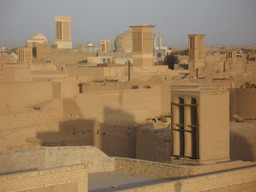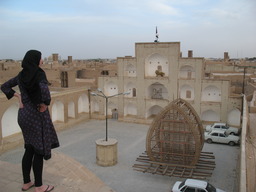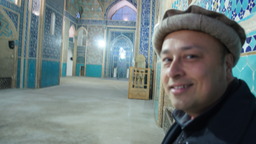
Yazd Skyline
 Yazd Skyline |
Emma cut our conversation mid-sentence to pull out pen and paper. Rather than speak aloud she continued the topic by writing out:
"He said to me that your phone may be tapped. Because you're American traveling on another passport and know many languages. Staff report all foreigners to Secret Service and thinks they're keeping an eye on you. You spend too much time in your room, etc."
I hadn't expected any of this written reply. Her long note was in response to an idle question. I'd just asked Emma what one of the hotel staff had been saying to her earlier in the day when I saw the two of them whispering for several minutes on the other side of the courtyard. I hadn't imagined that I was the topic.
"Oh. Really?", I said after reading her note. My first reaction was indifference:
"We don't have to be all cloak-and-dagger sitting here in this restaurant. Let's just talk aloud.
"I think I'd actually be more surprised if what you just told me was the opposite, that foreign travelers weren't observed. I know that they kept close tabs on travelers when we were back in Pakistan. Traveling around here in particular, I guess I must attract especial attention. Not many people from the U.S. travel solo around Iran. When I say that I'm American, that must really perk up people's ears," I said.
 Emma Explores Yazd |
It would come as no surprise to anybody in this country to hear that communications are regulated. When typing the website address of most major media outlets (e.g., news.bbc.co.uk) into a web browser, an alternate page in Farsi offering suggestions of other topics you might want to search for is served up. Attempting to download certain podcasts consistently ends in no data transferred and an error message. Which podcasts make the cut seem to be based on subject matter.
The censorship must be carried out according to some crude system of filtering keywords. I was amused on my first visit to Iran three years ago to find that one of the benign podcasts to which I subscribe, Grammar Girl's Quick and Dirty Tips for Better Writing was among the few blocked. I'm still guessing at which of the words in that title set off the censors. "Girl?" "Dirty?" "Grammar?" (Three years later, the Grammar Girl podcast is yet blocked within Iran.)
Even in the short time since I entered the country the Internet has become increasingly restricted. When I arrived a month ago, approximately 70% of podcasts would download without problem. Now, none at all are coming through. Additionally, webpages of some of the news sites that I could freely access at the beginning of this visit, (e.g. America's National Public Radio) now route to that alternate page in Farsi. I assume that this tighter throttling of data flow is on account of recent protests throughout the region and cities within in Iran.
 I was surprised to discover in myself what it is I've most missed while in this zone of restricted Internet access. Of all things, what I've found myself spending most of my time attempting to download through the firewalls has been... a soap opera. I've been subscribed via podcast to a BBC radio drama, The Archers, since I was introduced to the program over my last visit to England. Six days a week a new 13-minute episode has been automatically plopping itself onto my computer. I hadn't realized how closely I'd been following characters in the fictional village of Ambridge--until I found the podcast suddenly blocked, here.
I was surprised to discover in myself what it is I've most missed while in this zone of restricted Internet access. Of all things, what I've found myself spending most of my time attempting to download through the firewalls has been... a soap opera. I've been subscribed via podcast to a BBC radio drama, The Archers, since I was introduced to the program over my last visit to England. Six days a week a new 13-minute episode has been automatically plopping itself onto my computer. I hadn't realized how closely I'd been following characters in the fictional village of Ambridge--until I found the podcast suddenly blocked, here.
Not keeping updated on my soap opera may be annoying, but it's downright frustrating to be unaware of the latest world news. Assuming that the news outage (and occasional cuts to cellphone service) is in response to the protests and revolutions currently sweeping the Middle East, I've been wanting to follow regional and world events far more closely than I normally would.
I have figured out how an older means of technology has become better at accessing outside information than the Internet, now. Everywhere I travel I take a small shortwave radio. From here in Yazd, The BBC World Service fades in and out on several locations around the dial. The signal is so crackly and warbly that I can't always understand all of the 5-minute world news read at the top of each hour. But, I can usually hear enough to know if there have been any significant events happening within Iran.
Long before finishing our dinner, Emma and I had moved onto other subjects. By the time we'd returned to the hotel I was thinking less about spooky surveillance and more about how much I enjoy this city in the desert, how hard it would be to leave Yazd behind to make my way along to my next destination. But, after returning to my room I drew the note Emma had written out of my pocket and re-read it. Was there any truth to it? And if so, did it really matter that I was being observed?
It felt a touch paranoid, but I lit a match, set the paper aflame, then ran tap water to flush the ashes down the sink.